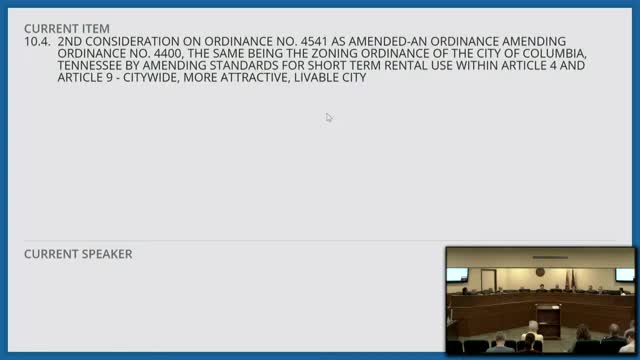Columbia council amends zoning to allow short-term rentals in core commercial districts, grandfathers some existing operators
Get AI-powered insights, summaries, and transcripts
Subscribe
Summary
The City Council adopted an amended zoning ordinance that allows short-term rentals without an owner-occupancy requirement in core downtown and commercial districts, and added a grandfathering provision for units that remitted occupancy taxes before 04/10/2025.
The City Council of the City of Columbia on April 10 approved an amended zoning ordinance that will permit short-term rental (STR) units without an owner-occupancy requirement in central commercial districts and establish a process to permit certain existing operators in other residential districts.
The vote followed more than two hours of public comment and council debate. The final ordinance (amended ordinance 45-41) allows STRs in Character Districts CD-4, CD-4C and CD-5 without an owner-occupancy condition and adds a grandfathering path for properties outside those districts that can document recent occupancy-tax remittance.
Council members and city staff said the change was intended to balance the city’s interest in protecting residential neighborhoods with preserving downtown tourism and the incomes of existing operators.
City Attorney (name not specified) told council members that state law already protects some preexisting uses and explained the legal limits the city faces. “If you currently have a license, [you are] legal,” the City Attorney said during the discussion, adding that state law protects properties that were operating and remitting occupancy tax for six of the 12 months immediately before July 2022.
Zoning administrator Mr. Keltner explained how the city’s prior zoning code treated short-term rentals and why some units are already lawful nonconforming uses. He told the council that many addresses raised in public comment were established under the earlier code and “are actually already legal nonconforming as is today.”
Several residents and operators urged the council to preserve STRs. Steve Napier, who addressed the council during the public comment period, said: “I just would implore you again just to reconsider this regulation about short term rentals.” Mercedes Robinson, who identified herself as an STR operator, described safety steps she takes at her properties: “I have fire extinguishers. I have gone above and beyond in every way possible.” Josh Magee, who manages properties, said STRs support local jobs — cleaners, maintenance workers and contractors — and urged council to accommodate them.
Other speakers, including Planning Commission vice chair Sue Stevenson, urged limits in lower-density residential districts. Stevenson said the Planning Commission voted 6-0 to amend the short-term rental ordinance and recommended keeping STRs prohibited in CD-2 and CD-3 districts to “preserve the peace and solitude and beauty of these district areas.”
After public comment the council debated several amendments. The mayor proposed, and council approved, language that lets properties that had remitted occupancy (hotel/motel) tax for at least six of the prior 12 months (counting to 04/10/2025) apply for a short-term rental permit and continue operating until the property is sold, transferred, unused as an STR for 30 months, or is found in violation of local law three or more times — mirroring statutory grandfathering conditions. Council also removed conditional-use references to the Board of Zoning Appeals to avoid a patchwork of case-by-case approvals that staff said could create inconsistent treatment and potential litigation.
The final motion, as adopted, requires affected operators to apply for a city STR permit and to provide proof of occupancy-tax payments by December 31, 2025, if they seek to preserve grandfathered status. The council voted to approve the ordinance as amended; Council member roll call showed unanimous support for the final package.
Council members emphasized the ordinance is not a permanent freeze: they discussed future adjustments such as stricter limits near parks or a defined downtown radius that might receive special treatment.
The new rules take effect on adoption; the ordinance as amended sets administrative permitting and fee provisions in the development services fee schedule (ordinance 45-37) as the council simultaneously amended that fee schedule to align with the STR permit process.
The change drew repeated questions about properties the city has promoted on tourism pages and how those listings had been handled previously; staff said promotion does not itself determine zoning status and reiterated that many of the questioned properties had been legally operating under prior ordinances.
The ordinance text adopted by council mirrors the state’s grandfathering parameters and adds a local permitting deadline and enforcement triggers; the council made cleanup edits to accessory-use tables so principal- and accessory-use listings align.
Council members and staff said they expect to continue monitoring outcomes and to consider future refinements, including targeted geographic restrictions or enhanced enforcement for repeat offenders.
Ending: The council adopted the amended short-term rental ordinance and related fee changes on voice/roll-call votes after two amendments; the city will begin accepting permit applications under the new rules and has set a year-end deadline for operators seeking grandfathered status to submit evidence of occupancy-tax payments.
